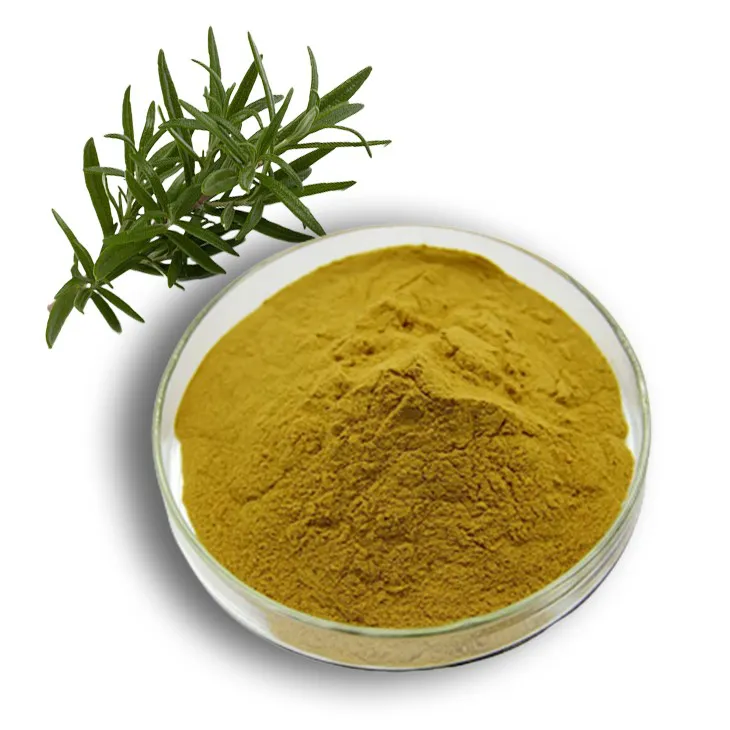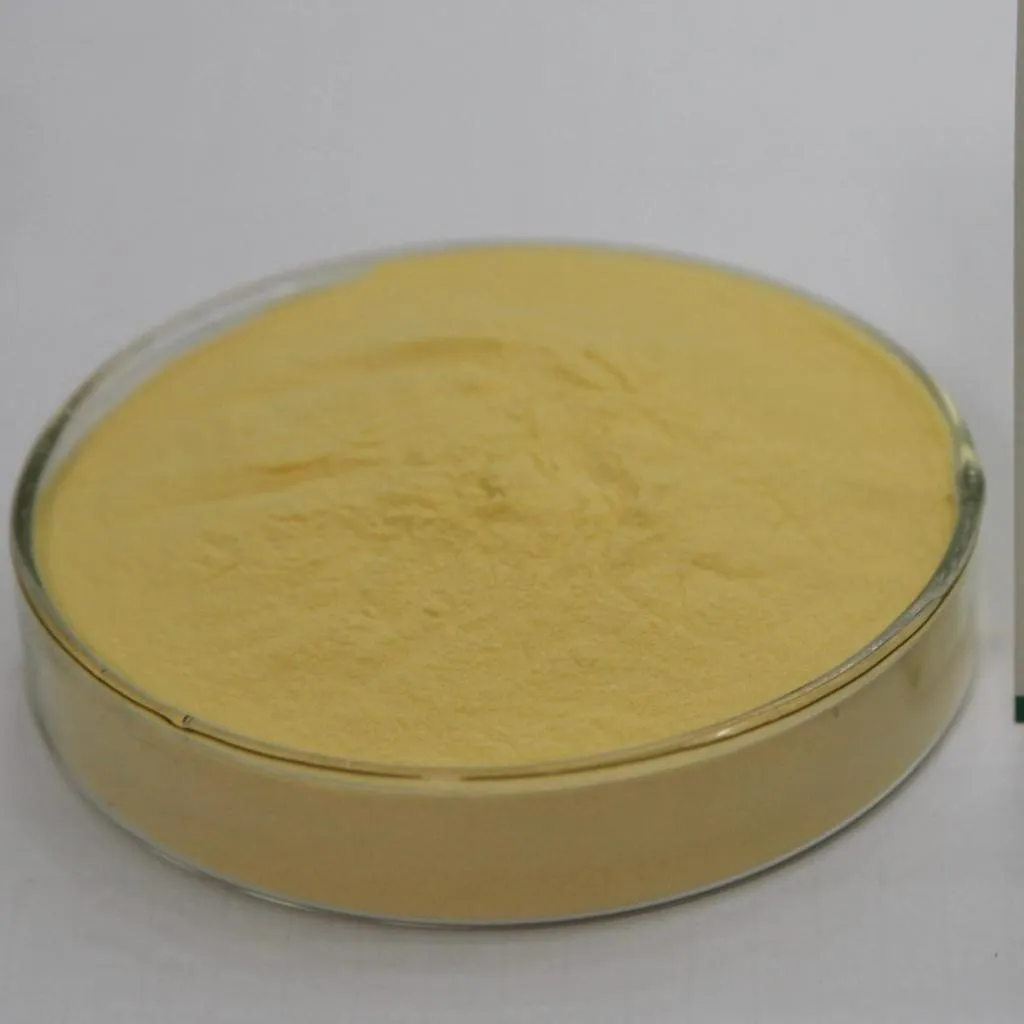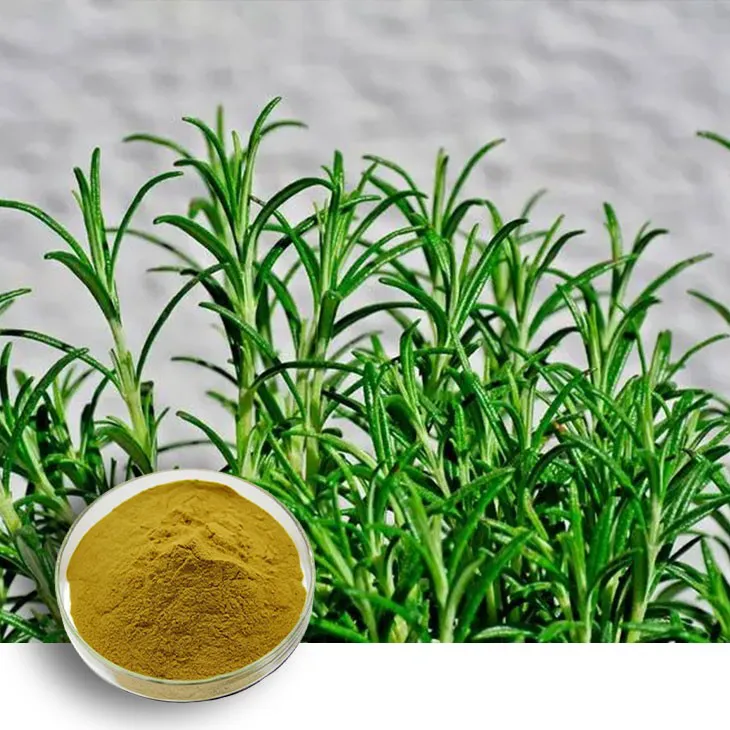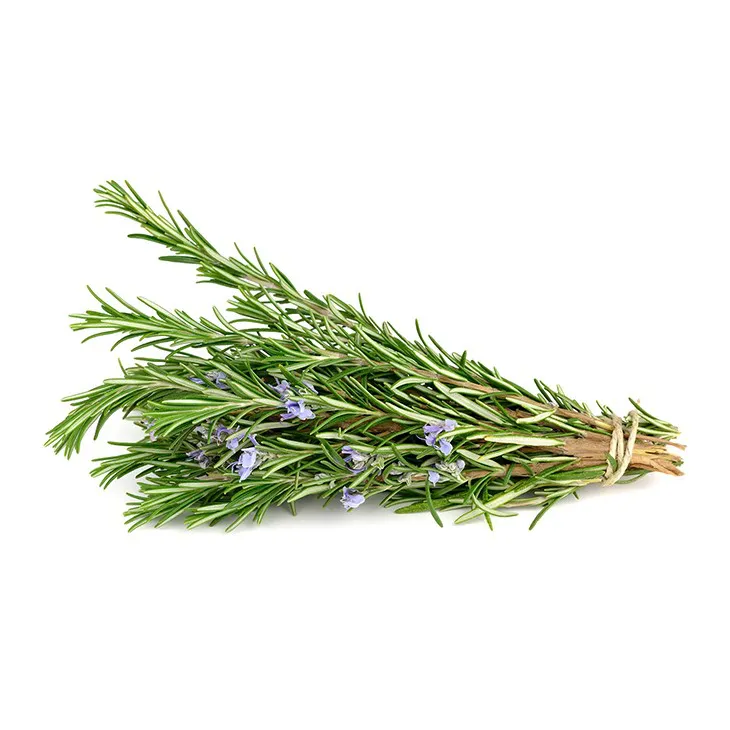- 0086-571-85302990
- sales@greenskybio.com
Mature rosemary flavor and natural rosemary extract.
2024-11-13

1. Introduction
Rosemary is a well - known herb that has been used for centuries in various aspects of human life. The mature rosemary flavor and natural Rosemary extract both have their unique characteristics, and understanding the differences between them is crucial in different fields such as aromatherapy, cosmetics, and culinary arts.

2. Origins of Rosemary
Rosemary (Rosmarinus officinalis) is native to the Mediterranean region. It is a perennial herb with needle - like leaves and blue - violet flowers. It thrives in sunny and well - drained soil conditions.
2.1 Cultivation
Today, rosemary is widely cultivated around the world. In some areas, it is grown on a large scale for commercial purposes. The cultivation process involves proper watering, fertilization, and protection from pests and diseases.

3. The Mature Rosemary Flavor
3.1 Aroma Profile
The mature rosemary flavor has a rich and complex aroma. It is often described as having herbaceous, woody, and slightly pine - like notes. This complex aroma is the result of a combination of various volatile compounds present in the plant as it matures.
3.2 Factors Affecting the Flavor
- The age of the rosemary plant: As the plant matures, the flavor becomes more intense and complex.
- Environmental factors: Such as sunlight, soil type, and climate can influence the development of the flavor.
- Harvesting time: Picking rosemary at the right time can ensure the best flavor. Harvesting too early or too late may result in a less desirable flavor.

4. Natural Rosemary extract
4.1 Extraction Methods
- Solvent Extraction: One common method is using solvents like ethanol or hexane. The rosemary plant material is soaked in the solvent, and the active compounds are dissolved. Then, the solvent is removed, leaving behind the extract. However, this method may leave some solvent residues if not properly purified.
- Steam Distillation: In this method, steam is passed through the rosemary plant material. The volatile compounds are carried away with the steam and then condensed. This results in an essential oil, which can be further processed to obtain the extract. Steam distillation is a more natural and widely accepted method as it does not involve potentially harmful solvents.
- Supercritical Fluid Extraction: Using supercritical carbon dioxide as the extraction medium. This method can extract a wide range of compounds with high selectivity and efficiency. It also has the advantage of leaving no solvent residues, but it requires more sophisticated equipment and higher costs.
4.2 Composition of the Extract
Natural Rosemary extract contains a variety of active compounds. The main components include rosmarinic acid, carnosic acid, and various essential oils such as cineole and camphor. These compounds are responsible for the extract's antioxidant, anti - inflammatory, and antimicrobial properties.

5. Contrasts between Mature Rosemary Flavor and Natural Rosemary Extract
5.1 Aroma and Flavor Intensity
The mature rosemary flavor has a more diffuse and complex aroma that is characteristic of the whole plant. In contrast, the natural rosemary extract has a more concentrated aroma. The extract, especially the essential oil - based extract, has a very intense smell that can be overpowering if not used in moderation.
5.2 Chemical Composition
While the mature rosemary flavor represents the overall volatile compounds present in the plant in its natural state, the natural rosemary extract is a more concentrated form with a higher proportion of certain active compounds. For example, the extract may have a much higher concentration of rosmarinic acid compared to the plant in its natural state with just the flavor.
5.3 Application in Different Fields
- Aromatherapy:
- The mature rosemary flavor can be used in a more natural form, such as in dried rosemary sachets or in fresh rosemary bouquets in a room. It provides a gentle and long - lasting aroma that can help in relaxation and stress relief.
- Natural rosemary extract, especially in the form of essential oils, is often used in aromatherapy diffusers. Due to its high concentration, it can have a more immediate and intense effect on mood elevation and stress reduction.
- Cosmetics:
- The mature rosemary flavor may be used in some natural cosmetics as an ingredient for its pleasant smell. However, its functional properties are limited in this form.
- Natural rosemary extract is widely used in cosmetics for its antioxidant and antimicrobial properties. It can help in protecting the skin from free radical damage and prevent the growth of bacteria on the skin.
- Culinary Arts:
- The mature rosemary flavor is essential in cooking. Fresh or dried rosemary leaves are used to season various dishes, adding a unique flavor. The whole - plant flavor blends well with other ingredients in cooking.
- Natural rosemary extract can also be used in cooking, but it needs to be used with great caution due to its high concentration. A small amount can add a strong rosemary flavor to a dish.
6. Significance in Aromatherapy
6.1 Effects on the Mind
- Both the mature rosemary flavor and the natural rosemary extract have been associated with improving mental focus and concentration. The aroma of rosemary has been shown to enhance cognitive performance.
- They can also help in reducing stress and anxiety. The relaxing properties of rosemary are beneficial for those suffering from high - stress levels.
6.2 Effects on the Body
- In aromatherapy, rosemary - based products can have a positive impact on respiratory health. They can help in clearing the nasal passages and relieving congestion.
- Some studies suggest that the compounds in rosemary may also have a mild analgesic effect, although more research is needed in this area.
7. Significance in Cosmetics
7.1 Skin Health
- Natural rosemary extract, with its antioxidant properties, helps in protecting the skin from environmental damage. It can prevent premature aging of the skin by neutralizing free radicals.
- The antimicrobial properties of the extract can also be useful in treating acne and other skin infections. It helps in keeping the skin clean and free from harmful bacteria.
7.2 Hair Care
- Rosemary has been traditionally used in hair care. The natural rosemary extract can be added to shampoos and conditioners. It is believed to stimulate hair growth by improving blood circulation to the scalp.
- It can also help in preventing dandruff and keeping the hair healthy and shiny.
8. Significance in Culinary Arts
8.1 Flavor Enhancement
- The mature rosemary flavor adds depth and complexity to a wide range of dishes. It pairs well with meats, such as lamb and chicken, enhancing their natural flavors.
- It is also used in baking, adding a unique herbal note to bread and pastries.
8.2 Preservation
- Rosemary, both in its natural flavor form and as an extract, has some antimicrobial properties. In traditional cooking, adding rosemary to dishes can help in preserving them for a longer time.
- For example, in pickling or making preserves, rosemary can be used to prevent the growth of spoilage - causing microorganisms.
9. Conclusion
In conclusion, the mature rosemary flavor and natural rosemary extract have distinct characteristics. Understanding these differences is important for their optimal use in various fields. Whether it is in aromatherapy, cosmetics, or culinary arts, both forms of rosemary offer unique benefits that can be harnessed depending on the specific requirements of each application.
FAQ:
Question 1: What is the main difference in aroma between mature rosemary scent and natural rosemary extract?
The mature rosemary scent has a rich and complex aroma that is more diffusive and natural as it is directly associated with the plant in its mature state. Natural rosemary extract, on the other hand, has a more concentrated aroma. It is often processed in a way that intensifies certain aspects of the rosemary's smell. The extract may lack some of the more subtle and nuanced scents that are present in the overall mature plant scent.
Question 2: How are mature rosemary scent and natural rosemary extract obtained?
The mature rosemary scent is simply the fragrance that emanates from a fully grown rosemary plant. It can be experienced by smelling the fresh or dried leaves of the plant. Natural rosemary extract is obtained through various extraction methods. One common method is solvent extraction, where solvents are used to draw out the active compounds from the rosemary plant. Another method is steam distillation, which separates the essential oils (a major part of the extract) from the plant material.
Question 3: In aromatherapy, what are the unique benefits of mature rosemary scent compared to natural rosemary extract?
The mature rosemary scent in aromatherapy can provide a more holistic and gentle experience. It can create a natural and relaxing atmosphere similar to being in a rosemary garden. Natural rosemary extract, being more concentrated, may have a more intense effect. It can be used in specific blends to target particular issues such as stress relief or improving concentration. However, the extract needs to be used more carefully due to its potency.
Question 4: How are they used differently in cosmetics?
Mature rosemary scent can be used in cosmetics mainly for its pleasant aroma, providing a natural and fresh scent to products. Natural rosemary extract, because of its concentrated properties, is often used for its antioxidant, antimicrobial, and anti - inflammatory properties. It can help in preserving the product, as well as providing benefits to the skin such as reducing inflammation and protecting against environmental damage.
Question 5: Can they be used interchangeably in culinary arts?
They cannot be used completely interchangeably in culinary arts. The mature rosemary scent can be obtained by using fresh or dried rosemary leaves in cooking, which imparts a more traditional and mild rosemary flavor. Natural rosemary extract is much more concentrated. Using too much of the extract can overpower a dish, while using the right amount can add a very intense rosemary flavor. So, they are used in different quantities and for different flavor intensities in cooking.
Related literature
- The Aromatic World of Rosemary: Scent and Extract"
- "Rosemary in Aromatherapy, Cosmetics and Culinary: A Comparative Study of Scent and Extract"
- "Extraction Methods of Rosemary and Their Impact on the Scent and Properties of the Extract"
- ▶ Hesperidin
- ▶ citrus bioflavonoids
- ▶ plant extract
- ▶ lycopene
- ▶ Diosmin
- ▶ Grape seed extract
- ▶ Sea buckthorn Juice Powder
- ▶ Beetroot powder
- ▶ Hops Extract
- ▶ Artichoke Extract
- ▶ Reishi mushroom extract
- ▶ Astaxanthin
- ▶ Green Tea Extract
- ▶ Curcumin Extract
- ▶ Horse Chestnut Extract
- ▶ Other Problems
- ▶ Boswellia Serrata Extract
- ▶ Resveratrol Extract
- ▶ Marigold Extract
- ▶ Grape Leaf Extract
- ▶ blog3
-
High purity olive leaf extract
2024-11-13
-
Lavender oil extraction method
2024-11-13
-
100% organic virgin sea buckthorn fruit oil
2024-11-13
-
Lotus leaf extract powder factory in China
2024-11-13
-
China aged garlic extract supplier
2024-11-13
-
Deer antler extract powder manufacturer
2024-11-13
-
Saw palmetto extract vs whole herb
2024-11-13
-
Bayberry Extract
2024-11-13
-
Golden Seal Extract
2024-11-13
-
Selenium yeast
2024-11-13
-
Cat Claw Extract
2024-11-13
-
Citrus bioflavonoids
2024-11-13
-
Troxerutin
2024-11-13
-
Panax Ginseng Leaf Extract
2024-11-13
-
Grape Leaf Extract
2024-11-13
-
Curcumin
2024-11-13
-
Bitter Melon Extract
2024-11-13





















